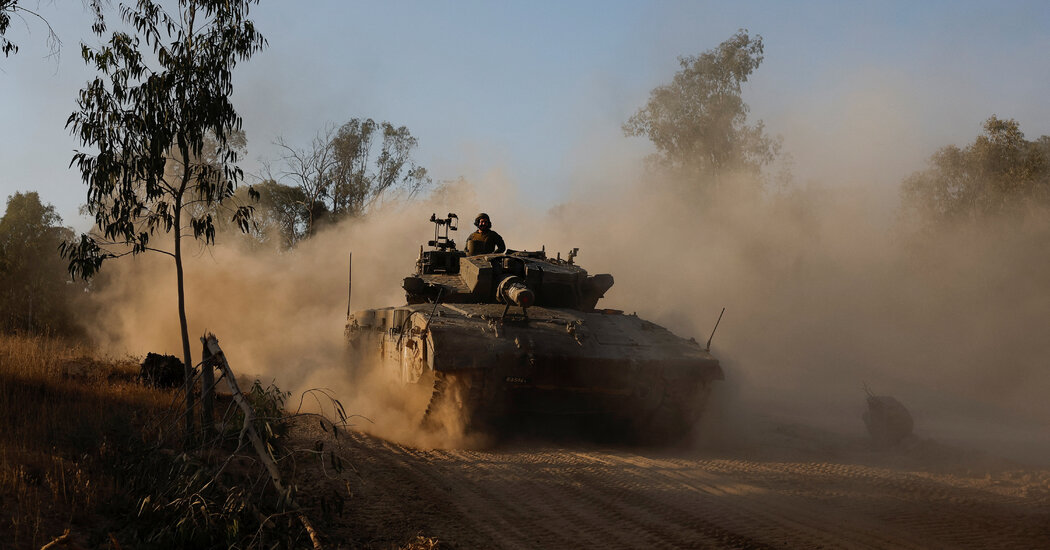President Biden raised hopes last week when he endorsed a plan that he said could lead to a “cessation of hostilities permanently.” He said Israel had put forward the plan, but neither Israel nor Hamas has said definitively that they would accept or reject the proposal, and they appear to still be locked in disagreement over fundamental issues.
Here’s a look at what is known about the cease-fire deal, which key points still must be negotiated, and the hurdles still ahead:
What’s in the plan?
Israel and Hamas agreed to a cease-fire in November that lasted for a week. But the proposal now on the table — as laid out by Mr. Biden, a senior U.S. administration official and Israeli officials — is more ambitious. Major issues remain unresolved, including whether Hamas would remain in control of the Gaza Strip.
The proposal would unfold in three phases.
In phase one, among other things, Israel would withdraw from population centers in Gaza during a six-week cease-fire, and dozens of women and elderly hostages held in Gaza by Hamas and its allies would be exchanged for hundreds of Palestinian detainees in Israeli prisons.
During that time, talks over a permanent cease-fire would continue, and if successful, the deal would enter phase two, with the full withdrawal of Israel’s military from the enclave. All hostages and more Palestinian prisoners would be freed. Under phase three, Hamas would return the bodies of hostages who had died, and a three- to five-year reconstruction period, backed by the United States, European countries and international institutions, would begin.
What are Israel’s concerns?
One of the key gaps between Hamas and Israel over the plan is the length of the cease-fire and the future role of Hamas. Prime Minister Benjamin Netanyahu of Israel said on Monday that he was open to a six-week cease-fire, according to a person who attended a closed-door meeting he held with Israeli lawmakers. But publicly he has said that Israel will fight until Hamas’s governing and military capabilities are destroyed.
As the proposal has been laid out, it appears that Hamas would conduct talks over phases two and three with Israel, which suggests that it would retain some measure of control of Gaza. Mr. Netanyahu has repeatedly said that this is a red line and has also ruled out a governing role for the Palestinian Authority, a fierce rival to Hamas that has limited governing powers in the Israel-occupied West Bank.
The Israeli prime minister is facing competing pressures from the United States and other allies to end the war and, on the other side, from two far-right partners in his governing coalition that have threatened to bring down his government should Israel agree to a deal that would end the war without eliminating Hamas.
In a sign of that pressure, one of them, Israel’s far-right security minister, Itamar Ben-Gvir, said on Wednesday that his party would continue to disrupt Mr. Netanyahu’s coalition until he published details of the proposal. Two Israeli officials confirmed this week that the offer shared by Mr. Biden generally aligned with the most recent cease-fire proposal that Israel had presented in talks mediated by Qatar and Egypt.
What about Hamas?
Hamas has said it was responding “positively” to the plan, but at a news conference on Tuesday, Osama Hamdan, a Hamas spokesman, said that Hamas had informed mediators that the group could not approve an agreement that doesn’t provide for a permanent cease-fire, a total withdrawal of Israeli troops and a “serious and real deal” to exchange Palestinian prisoners for hostages.
The same day, Sami Abu Zuhri, a member of Hamas’s political bureau, accused Israel of not being serious about a deal and said the White House was putting pressure on Hamas despite “knowing that the problem lies” with the Israelis.
Many residents of Gaza say they are desperate for an end to the war but analysts note that Hamas, an armed group, is not responsive to the wishes of the enclave’s civilians. Political experts say that the group’s leaders, including its most senior official in the territory, Yahya Sinwar, may be in no hurry to end the conflict, perceiving in part that Hamas’ leverage will diminish once it agrees to release the hostages.
Mr. Sinwar, the presumed mastermind of the Oct. 7 attack, still have to weigh in on the proposal, a person briefed on the negotiations said.
Adam Rasgon contributed reporting.
